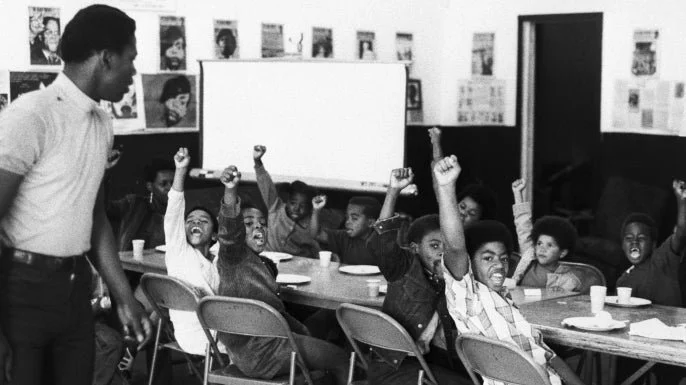The Black Panther Party and the Legacy of their Free Breakfast Program
By Zoe Salvato-Cutter
The last article I wrote in this series featured a protest demanding respect and dignity for immigrants; it was an example of solidarity in our larger community. This time, I want to take a look at the past- specifically, at the Free Breakfast program run by the Black Panther Party in the 1960’s.
As many of us know, the Black Panthers were a revolutionary group that promoted freedom and civil rights for Black Americans, and more broadly, all oppressed peoples. Founded by two college students, Huey Newton and Bobby Seale, in 1966, the initial scope of the group was to protect Black communities from police brutality. The group created a series of ten demands, among which safety, freedom, decent housing, and education.
As the party expanded, community members began looking to the Panthers for support with issues like food insecurity and evictions. The Panthers recognized that poor children were often too hungry at school to pay attention in class. In 1969, Seale coordinated a Free Breakfast program alongside the parishioners of St. Augustine’s Church in Oakland, enlisting the help of local mothers and store owners.
In 1969, more than 20,000 young students participated in the Free Breakfast Program in 23 cities. Rodney Leonard, the National School Lunch Program administrator, admitted in a 1969 Senate hearing that the Panthers were likely feeding more students than the federal government was.
Parishioner of St. Augustine’s Church and core team member of the Free Breakfast initiative, Ruth Beckford, said in an interview with University of Georgia professor Nik Haynen, “The school principal came down and told us how different the children were. They weren’t falling asleep in class, they weren’t crying with stomach cramps.”
Ultimately, FBI Director J. Edgar Hoover facilitated the violent closing of the Free Breakfast Program, mandating officers to raid meals and spread rumors the food was poisoned. He recognized the initiative as extremely effective in improving the public image of the Panthers, who he deemed a threat to national security, alongside other civil rights groups. The Panthers’ leadership crumbled due to internal strife and interference from the FBI, but the popularity of their social programs put immense pressure on the national government to implement its School Breakfast Program, which now feeds nearly 15 million children before school.
In our current political climate, where the government is using secret police tactics to sow fear in the immigrant community, I’ve been finding myself drawn to find precedents in history books. How have communities shown up for each other while facing government persecution? How is this manifesting today?
In the absence of institutionalized recognition of civil rights, communities show up for each other in organized ways. It’s happening in East Boston at this very moment, with groups like Mutual Aid Eastie providing food, transportation, and innumerable forms of support to the members of the community.
I may not have the answers, but I know we must look to history to understand the present. What lessons will you take with you about the rise and fall of the Panthers’ Free Breakfast Program?

